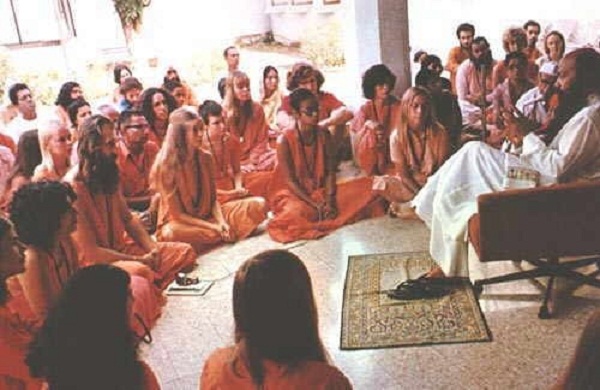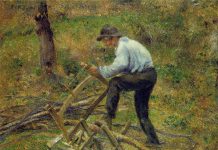Hui Neng, a Chinese master, was working under his master. When Hui Neng went to his master, the master said, “For what have you come here? There is no need to come to me.” He couldn’t understand. Hui Neng thought that he was not yet ready to be accepted, but the master was seeing something else. He was seeing his growing aura. He was saying this: “Even if you do not come to me, the thing is bound to happen sooner or later, anywhere. You are already in it, so there is no need to come to me.”
But Hui Neng said, “Do not reject me.” So the master accepted him and told him to go just behind the monastery, in the kitchen of the monastery. It was a big monastery of five hundred monks. The master said to Hui Neng, “Just go behind the monastery and help in the kitchen, and do not come again to me. Whenever it will be needed, I will come to you.”
No meditation was given to Hui Neng, no scriptures to read, study or meditate upon. Nothing was taught to him, he was just thrown into the kitchen. The whole monastery was working. There were pundits, scholars, and there were meditators, and there were yogis, and the whole monastery was agog. Everyone was working and this Hui Neng was just cleaning rice and doing kitchen work.
Twelve years passed. Hui Neng didn’t go again to the master because it was not allowed. He waited, he waited, he waited… he simply waited. He was just taken as a servant. Scholars would come, meditators would come, and no one would even pay any attention to him. And there were big scholars in the monastery.
Then the master declared that his death was near, and now he wanted to appoint someone to function in his place, so he said, “Those who think they are enlightened should compose a small poem of four lines. In those four lines you should put all that you have gained. And if I approve any poems and see that the lines show that enlightenment has happened, I will choose someone as my successor.”
There was a great scholar in the monastery, and no one attempted the poem because everyone knew that he was going to win. He was a great knower of scriptures, so he composed four lines. Those four lines were just like this… the meaning of it was like this: “Mind is like a mirror, and dust gathers on it. Clean the dust, and you are enlightened.”
But even this great scholar was afraid because the master would know. He already knows who is enlightened and who is not. Though all he has written is beautiful, it is the very essence of all the scriptures — mind is like a mirror, and dust gathers on it; remove the dust, and you are enlightened — this was the whole gist of all the Vedas, but he knew that was all that it was. He had not known anything, so he was afraid.
He didn’t go directly to the master, but in the night he went to the hut, to his master’s hut, and wrote all the four lines on the wall without signing — without any signature. In this way, if the master approved and said, “Okay, this is right,” then he would say, “I have written them.” If he said, “No! Who has written these lines?” then he would keep silent, he thought.
But the master approved. In the morning the master said, “Okay!” He laughed and said, “Okay! The man who has written this is an enlightened one.” So the whole monastery began to talk about it. Everyone knew who had written it. They were discussing and appreciating, and the lines were beautiful — really beautiful. Then some monks came to the kitchen. They were drinking tea and they were talking, and Hui Neng was there serving them. He heard what had happened. The moment he heard those four lines, he laughed. So someone asked, “Why are you laughing, you fool? You do not know anything; for twelve years you have been serving in the kitchen. Why are you laughing?”
No one had even heard him laugh before. He was just taken as an idiot who would not even talk. So he said, “I cannot write, and I am not an enlightened one either, but these lines are wrong. So if someone comes with me, I will compose four lines. If someone comes with me, he can write it on the wall. I cannot write; I do not know writing.”
So someone followed him — just as a joke. A crowd came there and Hui Neng said, “Write: There is no mind and there is no mirror, so where can the dust gather? One who knows this is enlightened.”
But the master came out and he said, “You are wrong,” to Hui Neng. Hui Neng touched his feet and returned back to his kitchen.
In the night when everyone was asleep, the master came to Hui Neng and said, “You are right, but I could not say so before those idiots — and they are learned idiots. If I had said that you are appointed as my successor, they would have killed you. So escape from here! You are my successor, but do not tell it to anyone. And I knew this the day you came. Your aura was growing; that was why no meditation was given to you. There was no need. You were already in meditation. And these twelve years’ silence — not doing anything, not even meditation — emptied you completely of your mind, and the aura has become full. You have become a full moon. But escape from here! Otherwise they will kill you.
“You have been here for twelve years, and the light has been constantly spreading from you, but no one observed it. And they have been coming to the kitchen, everyone has been coming to the kitchen every day — thrice, four times. Everyone passes through here; that is why I posted you in the kitchen. But no one has recognized your aura. So you escape from here.”
Osho
The Book of Secrets






